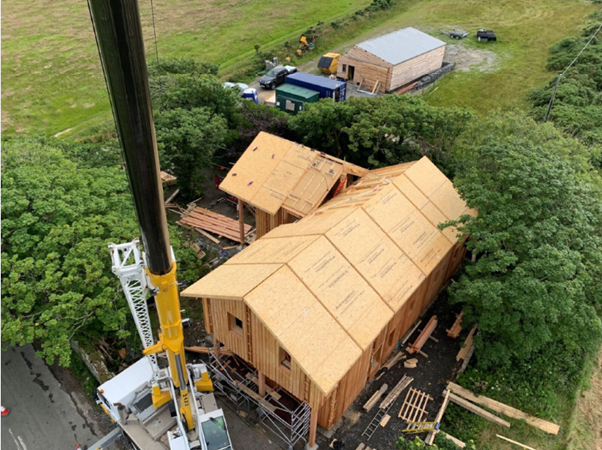The UK’s first 40OC day, in summer 2022, was the clearest indication that climate change has arrived in this country.
Last year’s record-breaking temperatures brought unprecedented heat-related deaths, wildfire incidents and significant infrastructure disruption. The impacts of climate change will intensify over coming decades, leaving the UK vulnerable without better resilience planning and preparation.
In this report on England’s adaptation progress, the Climate Change Committee publishes a new appraisal of the outcomes needed to build climate resilience across the economy – and the extent of policies and delivery to meet them.

There is a striking lack of climate preparation from Government:
- Policies and plans. Despite some evidence of improved sectoral planning by Government for key climate risks, ‘fully credible’ planning for climate change – where nearly all required policy milestones are in place – is only found for five of the 45 adaptation outcomes examined in this report.
- Delivery and implementation. In none of the 45 adaptation outcomes was their sufficient evidence that reductions in climate exposure and vulnerability are happening at the rates required to manage risks appropriately. For around one-quarter of outcomes, available indicators show insufficient evidence of progress.
Baroness Brown, chair of the Adaptation Committee, said: “The Government’s lack of urgency on climate resilience is in sharp contrast to the recent experience of people in this country. People, nature and infrastructure face damaging impacts as climate change takes hold. These impacts will only intensify in the coming decades.
“This has been a lost decade in preparing for and adapting to the known risks that we face from climate change. Each month that passes without action locks in more damaging impacts and threatens the delivery of other key Government objectives, including Net Zero. We have laid out a clear path for Government to improve the country’s climate resilience. They must step up.”
In 2022, Government’s own Climate Change Risk Assessment (CCRA3) identified 61 separate risks and opportunities for the UK from the changing climate. These span the natural environment, infrastructure, the economy, and society. The Committee’s report assesses progress in preparing for these risks.
The current National Adaptation Programme fails to match the scale of the challenge now facing the country. It lacks a clear vision. It is not underpinned by tangible outcomes or targets. It has not driven policy and implementation across Government.
Wider policy priorities, including Net Zero and nature recovery, will fail if adaptation to climate change is not incorporated from the start.
The absence of robust monitoring and evaluation is also a barrier. Key datasets to evaluate resilience do not exist or have limitations that prevent effective tracking of climate resilience. A well-resourced climate change adaptation monitoring and evaluation programme is now an urgent priority.
The Government will publish the third National Adaptation Programme (NAP3) this summer. The Committee’s report makes several recommendations for that new programme.
This is a make-or-break moment to avoid a further five years of lacklustre planning and preparation for the changing climate by Defra. A strong programme is also a key element of the UK’s contribution to the global effort to tackle climate change and an essential part of the UK’s international leadership on climate change.
The Committee plans a further appraisal of the third National Adaptation Programme following its publication later this year.
Hannah Giddings, Senior Advisor for Resilience at UKGBC said: “This report highlights the sheer scale of action needed to prepare the UK’s built environment for the full range of threats of our rapidly changing climate.
“While we have welcomed improvements in flooding policies and tackling overheating in building regulations for new residential properties, this report rightly asserts that the Government needs to act much more decisively and comprehensively to improve the UK’s resilience to climate change.
“Our members across the built environment are working hard to design and deliver buildings, communities, cities and infrastructure fit for the future. But with investment in climate resilience falling short by an estimated £10 billion every year, the Government must support our efforts with ambitious policies and standards, accurate data and measurement regimes, and crucial reforms to the planning system. Our built environment – and the people living in it – cannot afford any more delay.”
Environmental Audit Committee Chairman, Rt Hon Philip Dunne MP, said the CCC’s latest report paints an alarming picture.
“There are clearly significant holes in the policy response to the effects of climate change,” he continued. “We are seeing impacts now: the recent shortages of fruit and vegetables on supermarket shelves highlight the vulnerability of the food sector to climatic extremes. The reported increase in heat-related mortality during the record-breaking temperatures last summer demonstrates our need to adapt to the increasing frequency and intensity of heatwaves.
“The CCC’s assessment of nature and biodiversity raises clear concerns: indicators are either static or declining. Implementation to drive through the improvements set out in new environmental policies is critical, and work must start at pace on this. Nature must not be a casualty of man-made climate change.
“The Committee has called on the Government to address how we manage heat and energy in Britain’s homes. There are many existing measures that could keep homes warm in winter and cool in summer, cut energy bills and reduce fuel poverty. Insulating lofts and cavity walls can also keep the heat out and address overheating in homes. There is no tangible reason not to take quick action on addressing energy efficiency in our buildings: the Government just needs to get on with it.
“I sincerely hope that the significant policy gaps will be addressed when the Government responds later this week with its refreshed Net Zero Strategy.
“The heat is on the Government to show grit and determination to address the negative impacts that the changing climate will continue to have on our daily lives. Time is running out to adapt the country to the hotter drier summers and wetter winters which will be a feature of our future climate. Ministers must rise to the challenge now rather than pushing adaptation issues further down the agenda.”




















